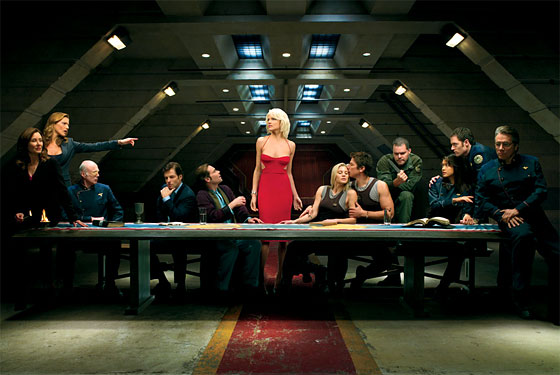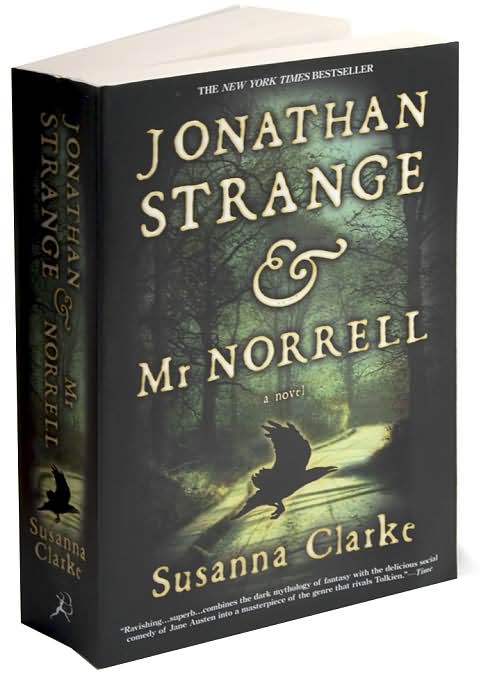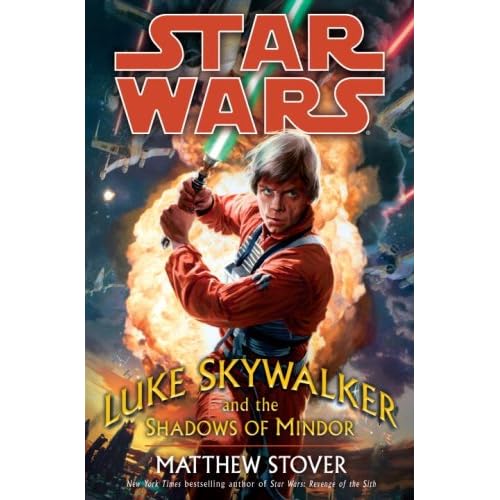It's coming up to the end of the year, and looking back, 2008 has been a very fun year for geeks everywhere - in books, television programs and films, among other things. Over the past couple of days, I've been thinking back over the year to see what was the best and worst of 2008.
The Best:
Starbuck returned from the Grave; The Fleet reaches Earth. (Battlestar Galactica Season 4)

The third season of Battlestar Galactica was a little rocky in the middle, but the last episodes set up a real bang. Starbuck was presumably killed, only to turn up during a major confrontation of the Human and Cylon fleets. Season 4 opens even bigger, with one of the best space battles that I've ever seen. Our four new cylons are freaking out, Starbuck's back and everything culminates in the discovery of Earth in episode 10.Galactica has long been one of my favorite shows, and with a certain end point in mind, Season four was where Galactica got somewhat back onto the tracks, with a fairly tight story arc, only to get to another long wait for the final ten episodes. It's been well worth it though.
Pushing Daisies... back from the Grave, and back to it

After a long hiatus due to the writer's strike (more about that in a bit) my favorite show of 2007-2008 came back with a new set of episodes. There are not enough good things that I can say about this show. We left off last year with Chuck learning that it was Ned that killed her father, only to end up at the end of this season with him being awoken. It was another season of fantastic storytelling, character development and extremely fantastic dialog. Unfortunately, the show has been axed due to low ratings. Fortunately, Bryan Fuller will be going to Heroes for the latter half of Season 3.
Lost Gets Better - Again.
Here's the situation. LOST season 1 blew everyone away. Season 2 drove them away. Season 3 brought some people back, and Season 4, everything got interesting again. This season was the best since Season 1, in my opinion. We had several new characters (my favorite was Daniel Faraday, the physicist), and a couple people killed off. We started seeing flash-forwards, where Jack has a beard and addicted to pain pills, Hurley's in a mental institution and Sayid is channeling Abram's Alias. Oh, and they get off the island. Then the island vanishes.
I have Leonard Nemoy's DNA? (The Big Bang Theory)
This show started in 2007, where I was annoyed by its laugh track and annoying characters. But this year, I started watching it and enjoying it. While it's certainly a very stereotypical portrayal of nerds and geeks, it's fun, because the creators have put in place a series of fun characters, and the writers make some jokes that are actually funny. This week's episode was absolutely priceless, when Sheldon gets a napkin signed by Leonard Nimoy. Now, if they'll just ditch the laugh track. This show's likely to be around for a while longer - it's been getting better and better ratings as the year goes on.
Back in a Nick of Time (Life on Mars)

One of my absolute favorite shows of all time was Life on Mars. Up until this year, it was only a BBC drama, until ABC picked it up and made a pilot. That pilot sucked, horribly, so the cast was ditched, except for Jason O'Mara, and the show was redone, set in New York City, given a good cast and started up. The result? A solid TV series that's mirrored the original (but it's starting to diverge a bit now), a wonderful soundtrack of classic rock and a story that's actually interesting. I can't wait for its return in 2009.
The Joker raises worldwide GDP. (The Dark Knight)

First, there was excitement when it was announced that the Joker was going to be the villain. Then Heath Ledger signed up for the role. Then he died earlier this year after filming was completed, leaving some people to wonder if the film would be released on schedule. Then Warner Brothers covered every surface they could find with Dark Knight ads. When the film was released, it went on to gross $996,680,514 in theaters. The film was a huge success, and a fantastic film at that. It was a comic book movie with true darkness, some real symbolism and good storytelling throughout. It's a pity that we won't see Heath Ledger reprise his role of The Joker, because he's done the best portrayal of a villain in recent film memory.
I am Iron Man (Iron Man)
Before The Dark Knight blew the doors off the box office, there was Iron Man. Iron Man has long been a favorite marvel superhero of mine, and everything fell into place for this film. Good story, well directed, fantastic casting (Robert Downey Jr. as Tony Stark was brilliant) and of course, the Mark II set of armor. Marvel proved that they could make a good superhero movie, one that was relevant and not stuck in the low-humor that characterized other comic book adaptations. Already, I can't wait for Iron Man 2. And Iron Man 3. And The Avengers.
Eeeeevvvvvaaaaaa (Wall-E)
Pixar has released what is possibly their best film to date. (Except maybe Toy Story and The Incredibles). Following a robot far from home, Andrew Stanton has presented a film with a cute, romantic science fiction story with some social commentary (said to be unintentional) woven into the CGI. Wall-E is easily the most appealing robot since R2-D2 hit the big screen in 1977, and his antics as he's pulled along for the ride (literally) are cute, heartbreaking and funny.And with very little real dialog.
Roar. Crunch. Repeat. (Cloverfield)
Monster movies meets social networking video and America gets its own monster. This film was brilliantly shot with an extremely fun concept. A monster comes and plays t-ball with the statue of liberty, and it's caught on camera by a bunch of twenty-somethings as they escape. The project was conceived of by LOST creator J.J. Abrams, and his fingerprints are all over it. From the lack of explanation of everything to the weird stuff, this is a very fun film to watch. Rumors are that there's a Cloverfield 2 being talked about.
With My Freeze Ray I Will Stop... The World (Dr. Horrible's Sing Along Blog)
This project was a huge success for Joss Whedon & Co. Conceived of during the Writer's strike, Whedon presents an aspiring supervillian, Dr. Horrible (Neil Patrick Harris), his buddies and his quest to finish his freeze ray, avoid Captain Hammer (Nathan Fillion) and win over Penny (Felicia Day). We're treated to musical numbers, crazy plots and a fantastic venture to prove that the internet is a viable place to release content.Take a look here.
Up, up and away! (When We Left Earth/NASA)

This year was NASA's 50th year in operation, and the Discovery channel released a fantastic documentary entitled When We Left Earth that touted its major achievements and failures throughout the years, bringing viewers some of the most incredible footage of space that I've ever seen, and telling a fantastic story of how NASA has come to be, with interviews with astronauts and support personnel. I get chills when I watch it, and wonder when we'll return to the moon and beyond.
Hobbit's Labyrinth (The Hobbit)
After long rumors, production problems and drama with Peter Jackson (who directed Lord of the Rings), Guillermo del Toro signed on to direct the upcoming Hobbit film and prequel. (Or two Hobbit films?) This is extremely good news, because the people who can adequately fill Jackson's shoes after LOTR are few and far between. del Toro is the perfect director for this project, and has already proven that he can do fantasy brilliantly, with his masterpiece Pan's Labyrinth. Plus, he can play in other people's universes, as per his work with the Hellboy films. (Which weren't as good, but fun)
Watchman Trailer (Watchman)
What's called the greatest graphic novel ever is coming to the big screen, much to the annoyance of its creator, and to FOX, apparently. A trailer for Watchman aired with The Dark Knight, and it made fanboys everywhere sit up and take notice. There's still complaints about how it's unfilmable and that it'll be too short or too long, but from my eyes? This looks like it'll be THE comic book film to see next year. It looks like it captured the feel of the comic book pretty well, and it's embellished a bit to look badass. Plus, Rorschach looks dead on. Just like I thought he'd be like.
Large Hadron Collider (Science)
The Large Hadron Collider was turned on on September 10th, to many worries about the world ending. Contrary to popular opinion, the earth didn't vanish in a tiny black hole. It was set to uncover the mysteries of the universe, but then it broke down again nine days later and won't be up online until 2009. But, it's still cool!
Geeks in Politics (Obama [spiderman, conan, superman] Patrick Leahy [Batman Cameo])
There's been a lot of geekiness in politics this year. No lightsaber waving from McCain this time around, but President Elect Obama has claimed to be a big Spiderman and Conan fan, and did a superman pose in Metropolis, IL. In addition to him, VT senator Patrick Leahy, a huge batman fan, had a cameo in The Dark Knight. He's also the head of the Senate Judiciary Committee. Ironic.
Superheroes: Fashion and Fantasy (Costumes)
The New York Metropolitan Museum of Art hosted an exhibit earlier this year (it's since closed) called Superheroes: Fashion and Fantasy. It featured a number of costumes from a number of classic films, such as the original Superman and Wonder Woman films, but also things as recently released as The Dark Knight and Iron Man. The fashion section was a bit of a miss for me, but the exhibit as a whole was just outstanding. Plus, they had several original copies of Superman and Batman, Spiderman and Iron Man on display. Covered in a plastic shield of course...
Star Wars Encyclopedia (Star Wars)
Del Rey released a new and expanded Star Wars Encyclopedia this year, one that is not only complete, but still remarkably up to date. That's not likely to last as long, given how fast LFL churns out canon material, but it's a beautiful repository of information in the universe. I can spend hours just paging through reading things.
"Anathem" By Neal Stephenson

I actually have yet to read this book, but it's caught my eye, and it's made a splash when it comes to the sci-fi literary world. All I really know about it is that it takes place on an earth-like world, and doubles as a philosophical text for knowledge and religion. I'll have to pick it up, and only expand my to-read list further.
A Game of Thrones picked up by HBO (Song of Fire & Ice)
Another book that I have yet to read, but I actually own this one. HBO has picked up the book for a series. If there's one thing that HBO does well, it's TV shows, because they can pour money into them and get a good result. And, they have a good track record with adaptations, with things such as Band of Brothers and John Adams. I'll watch this when it's released.
We'ss Har Wars End (Karen Traviss)
Several years in the making, Karen Traviss has finally finished her Wess'Har Wars series with book 6, Judge. Starting back in 2003, she introduced readers to a fantastic story of first contacts filled with alien races, political commentary and expert storytelling. Judge didn't deliver quite as well as I'd have liked (It certainly wasn't the strongest of the series), it carried the momentum well, and proved to be a good read, one that finished up one of my favorite series satisfactorily. Hopefully, Karen will be back to writing hard scifi again, because she's incredible at it.
Trooping (501st)

This year I got back into trooping with the 501st Legion. All in all, I did a total of 30 or so events, ranging from small affairs here in VT to much larger ones. The most memorable ones were the Boston St. Patrick's Day Parade, Burlington Kid's Day, the Weird Al Concert, St-Jean-sur-Richelieu Balloon Festival, Walk for Autisms, and the 2008 Woburn Halloween Parade. All my events are listed here.
With all the good things that have happened this year, there's the other side of the coin, and some letdowns, disappointments and pure flops.
Worst:
Writer's Strike
Okay, this started in 2007, but it messed up television for the foreseeable future, by ending some shows and putting others on a long hiatus that has really hurt ratings. Pushing Daisies was one casualty, Terminator was almost one, LOST was put off for a year, as was 24, and already, we're on the eve of another major strike over pretty much the same issues - internet distribution. Hopefully, some lessons will be learned.
Surviving a Nuclear Detonation (Indiana Jones)
Indiana Jones came back, and he came back bland. Indiana Jones and the Crystal Skull was an impossible undertaking to fill the hopes of fans for the past twenty years. While it's not a horrible film, it's nowhere near as high quality as Raiders or Crusade (although I did like it better than Doom). There was no passion, a crazy storyline and some annoying characters. It does have its moments, but they are few and far between.
Skyguy/Snips/Roger Roger (The Clone Wars)

Star Wars was another big LFL franchise that came back this year, and while The Clone Wars certainly had its moments, even high points, this film just extends the image of money grubbing that LFL is involved with, which is a shame. There's too much bad dialog, characters and situations to make this a good part of the Star Wars universe, but the TV show has been making some improvements. The animation is stunningly good, some of the stories are actually good, but every time the battle droids start talking, I want to throw something at my TV.
Michael Crichton Eaten by Cyborg T-Rex and Flesh eating Space Bacteria from the Past.
While my interest in Michael Crichton has waned over the years as he began to write crappy books (Such as Prey and State of Fear), there's no doubt that he's shaped my reading. I'm still a huge fan of Jurassic Park, The Andromeda Strain, Terminal Man and a number of his older novels. He's one of the most popular scifi authors (although he's resisted the genre title) out there with his works, most of which were made into films. It's a shame that he's passed - I was always hoping for another good story from him.
Gary Gygax failed his saving throw
Geek-God Gary Gygax likewise passed away this year, leaving behind a legacy that has shaped nerd-culture in the US forever. His creation, Dungeons and Dragons, along with co-creator Dave Arneson, was one of the defining features of geeks everywhere, something that I got into back in 2001. Along with giving geeks something to do in groups, it helped define a generation's activities, reading materials and conceptions of fantasy through to this day.
Arthur C Clarke becomes the Space Child

Arguably one of the greatest science fiction authors ever, Clarke's death hit the world hard. He helped to define the literary genre, and the actual science behind it, and was responsible for such classics as 2001: A Space Odyssey, Rama, Childhood's End, and numerous others, as well as the telecommunications satellite. He will be sorely missed, and is one of the last of the golden age of science fiction to be with us.(Today would have been his 91st birthday)
CNN Hologram technology
On election nigh, CNN touted their new thing in news casting, a hologram of Will.I.Am. Looked cool, and it looked like a hologram, but it was nothing more than a lot of cameras and empty space plus some CGI. Blah. Let's see some real technology in action please.
Close the Iris! (Stargate Atlantis)
I was a huge fan of Stargate SG-1, and same with Atlantis for the first couple of seasons. This season has just plain sucked. It's a shame, because there's a good concept there, amidst the horrible characters, stories and situations. Not long now, because Atlantis has been canceled, and will be replaced with Stargate Universe next year.
Even more Confusing and Confounding! (Heroes Season 3)
Heroes Season 1 was brilliant. It introduced a new spin on superheroes, only to fall to its own success and have a fairly slow and boring second season. (To be sure, the writer's strike had something to do with it, because it got better). Season 3 was promised to be bigger and better. And it was certainly bigger, with heroes coming back from the grave, more time travel and action, but none of it really made the same impression that season 1 did. I'm still behind episodes, but apparently it's been getting better. Now that Bryan Fuller's returning to the show, can we PLEASE start off really good and get better? Please?
Weird Science (Fringe)
I was really excited for Fringe, the latest show by JJ Abrams. It was a fun concept, and had a good couple episodes at first, but just became so dull that I stopped following it. I might pick it up again at some point, but only when I can marathon the entire thing at once.
Forrest J. Ackerman Dies
Forrest J. Ackerman, one of the first science fiction fans out there recently passed away. He was a key element of the spread of science fiction fandom, and he helped to found the LA Science Fantasy Society, among other numerous achivements, as well as influencing numerous authors over his long life.
Borders Downsizes SciFi Sections
I ranted about this earlier, as did a number of authors. Borders has been downsizing their sci-fi sections. While it's understandable that they have to sell items, and that they can't put everything on the shelf, you can't predict what the next big hit will be, and you can't know that until you actually start selling things.
That's it for this year. Next year, there's already quite a bit coming up. Should be a fun year.

























